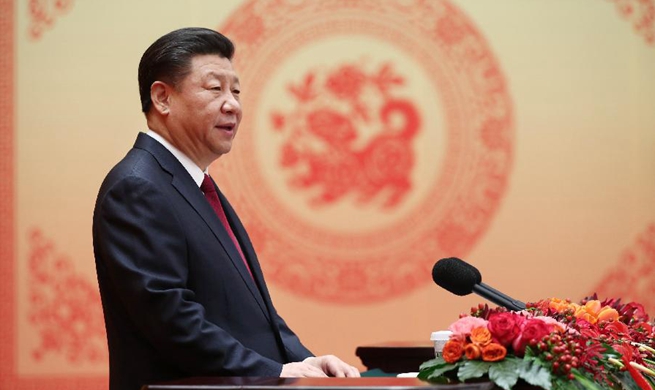by Alessandra Cardone
ROME, Feb. 15 (Xinhua) -- The leaders of some major parties in Italy have recently signaled they would prefer holding a new vote, in case the general elections scheduled on March 4 result in a hung parliament.
On Wednesday evening, center-right leader Silvio Berlusconi told local media the country should "immediately go again to the polls", in case of an unclear outcome next month.
"If there is no clear result, we have to go to the polls again, and in the shortest time possible, since there would be no majority able to change the current electoral law," Berlusconi told popular talk show "Porta a Porta" on state-run RAI TV.
His Forza Italia (FI) party is a major force within a center-right coalition that includes right-wing anti-immigrant League party as a key ally. The other two major contenders in the next elections are a center-left coalition led by the Democratic Party (PD), and anti-establishment, populist Five Star Movement (M5S).
All three political blocs polled more or less at around 30 percent, according to projections. The M5S was currently the single most popular party, followed by the PD -- which has ruled the cabinets in the last five years, but was now loosing weight and struggling to find a common ground with leftist minor forces.
As such, the center-right coalition altogether might have the best chances to get near 40 percent of votes, which was seen as a necessary target to win the majority of parliamentary seats with the current electoral law.
However, pollsters warned political uncertainty among voters remained very high, and a clear victory of the center-right coalition was not to be taken for granted. A hung parliament was still the most likely result of the next elections, they suggested.
Aware of the perspective, PD's leader and former Prime Minister Matteo Renzi recently showed a position similar to that of his rival Berlusconi.
"The PD will never form a government with extremist forces," Renzi said in an interview with RAI on Feb. 5.
"On this regard, I agree with Berlusconi: if there are no conditions (no majority to form a government), going back to the polls is the right thing to do."
The leader of the Five Star Movement, Luigi Di Maio, took a less definite stand. Assuming his party scored a robust result on March 4, he pledged the M5S would appeal to all the other parties in order to agree on a specific government agenda, and form a coalition cabinet.
"We do not want the country descend into chaos," Di Maio said at an electoral happening with entrepreneurs in Milan earlier this month.
If no agreement was possible on a government program, however, Di Maio said that "the only alternative is to go back to the polls."
Surveys held by Piepoli Institute and Euromedia Research pollsters on Feb. 12 averagely projected the M5S at around 27 percent, the PD with minor allies between 26 percent and 29.3 percent, and the center-right bloc between 37 percent and 38.6 percent.
Over one-third of Italians would still be unsure whether to vote, and in case, for whom, pollsters also said. A new electoral law approved last October was partially to blame for this unpredictability over the outcome of the next elections, according to analysts.
The so-called "Rosatellum" law allocates 36 percent of the seats via a first-past-the-post system, and 64 percent on a proportional basis. It also provides a 3-percent threshold for single parties to enter parliament, and a 10-percent threshold for coalitions.
Yet, unlike a previous version of the law, the current legislation will not grant any award -- in terms of additional seats -- to the party or coalition winning the highest number of votes in order to help it form a majority.

















